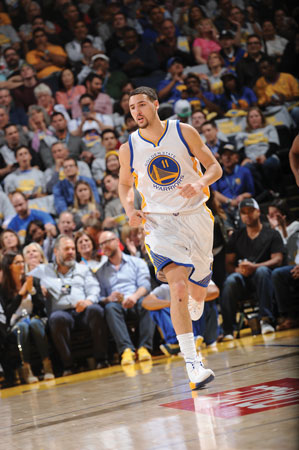StubHub’s antitrust lawsuit against Ticketmaster and the Golden State Warriors, one that could redefine the fundamental notion of sports ticketing, began with a series of unfruitful phone calls to the highest reaches of basketball.
“We reached out to the Warriors ownership. We reached out to [NBA Commissioner] Adam Silver to see if he could help. But unfortunately that was not successful,” said Michelle Fang, StubHub general counsel, describing the lawsuit filed recently as a “reluctant” step into the legal fray. “Litigation is always a last resort. But we believe firmly in free, open marketplaces, and what we’re seeing here is even season-ticket holders with a single seat having highly restrictive terms and conditions forced upon them.”
NYSE’s Cutler named as
new StubHub president
After an extensive search, eBay named Scott Cutler, former head of global listings for the New York Stock Exchange, as the new president of StubHub.
Cutler succeeds Chris Tsakalakis leading the ticket resale marketplace, owned by eBay since 2007. Tsakalakis left last November after a seven-year run that saw a marked elevation in the StubHub brand among ticket buyers and sellers. But Cutler will inherit leadership of a company facing sharply heightened competition in secondary ticketing, as well as a new, potentially industry precedent-setting lawsuit against the Golden State Warriors and Ticketmaster.
Prior to joining NYSE in 2006, Cutler held several other technology-focused positions within the financial services industry. Cutler is in the midst of relocating from New York to San Francisco, where StubHub is based, and will be there beginning in late June.
— Eric Fisher
StubHub’s antitrust lawsuit against Ticketmaster and the Warriors raises a series of precedent-setting issues surrounding ticket resale. In a complaint filed in U.S. District Court for the Northern District of California, StubHub alleges the team and Ticketmaster illegally conspired to force season-ticket holders to use only the Ticketmaster-powered NBATickets.com platform for ticket resale and restrict consumer choice. StubHub also claims the Warriors backed up those restrictions with threats to cancel season tickets and deny purchase opportunities for playoff tickets.
Within the claims are several far-reaching questions: To what extent can a team legally control resale options for a ticket? Is a team entitled to differentiate in its rules between an individual fan and a broker? How does one define who is a broker versus simply an active reseller? Is a ticket in reality a license governed by specific terms or a bearer instrument that can be easily transferred?
The broker issue in particular will be a focal point of the dispute. Like many other pro teams, the Warriors have steadily sought to reduce the amount of brokers in their season-ticket base. The move in part was an attempt to address a season-ticket waiting list that now numbers more than 10,500, each backed with a $100 deposit to be on there, and reduce the use of fraudulent tickets, which the team says number at least several dozen a game.
The team’s focus on the brokers follows a trend across the sports and music industries for promoters, teams and leagues to get more involved in the distribution and resale of their product. The club and Ticketmaster are likely to say in their coming legal response that individual fans remain free to list tickets on StubHub or anywhere else if they so choose. But Ticketmaster has long believed that like the TV, movie and recording industries, live entertainment should be governed by specific rules on the transfer of that content.
 |
The Warriors direct fans with season tickets to sell their extras in Ticketmaster’s marketplace.
Photo by: NBAE / GETTY IMAGES
|
The terms and conditions in Warriors’ season-ticket contracts list that “authorized resale of your tickets via online means is limited to NBAtickets.com.” That would appear to restrict other resale venues to only hard tickets, placing other outlets at a disadvantage in terms of time and digital transferability. That clause has upset many longtime Bay Area ticket brokers that trade in Warriors tickets.
“For years, the Warriors solicited us,” said Paul Ross, head of Golden Gate Tickets, a San Francisco-based broker, whose business in Warriors tickets has gone down in rates similar to the 80 percent reduction in listings StubHub claims. “They called us up every year to buy tickets. It would be one thing if they chose not to do business with us all this time and put in these restrictions, but they solicited us.”
The Warriors and Ticketmaster in separate statements issued after the filing of the StubHub claim strongly denied the allegations. Ticketmaster North America President Jared Smith in particular called StubHub’s action “a baseless lawsuit that asks the courts to help prop up its business against true fan-friendly competition.”
The next step legally will arrive next month, when Ticketmaster and the Warriors are due to respond to StubHub’s complaint. Among the options under consideration are a standard motion to dismiss and a full countersuit, which is not uncommon in antitrust cases such as this.
Sports industry senior executives admitted they are closely watching the case and see it as a landmark dispute, but few were willing to go on record. StubHub and Ticketmaster have been fierce rivals since StubHub’s formation in 2000, but never before has the battle reached this kind of stage.
“This really is a threshold case for the industry,” said Stephen Happel, an emeritus economics professor for Arizona State University who has extensively studied sports ticketing. “This really comes down to that fundamental license versus bearer instrument issue, which is huge. And if the Warriors and Ticketmaster win, you can certainly expect to see more of these kinds of restrictions elsewhere.”




